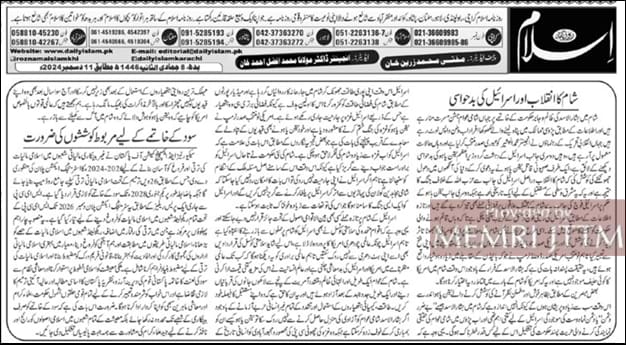Following the opposition victory over the Bashar Al-Assad regime in Syria and the fall of the Damascus, many dailies in Sunni-majority Muslim countries and elsewhere have expressed support for the transitional government in Syria. However, the publications note that the United States and Israel are in a position to play a major role in the new regional order in the Middle East, while Russia and Iran are not.[1]
Following are excerpts from editorials in three Pakistani dailies on the fall of Al-Assad. They state, among other points, that autocratic rulers such as Al-Assad did not learn from the fate of Saddam Hussein, Hosni Mubarak, or Muammar Al-Qaddafi. They also observe that Hay'at Tahrir Al-Sham (HTS) leader Abu Muhammad Al-Joulani could potentially play a moderate role in a future government.

A screenshot of the December 11, 2024 editorial in Roznama Islam.
"Netanyahu, Appearing To Try To Be Happy And Satisfied, Must Be Greatly Troubled At This Time Because He Knows How Important It Was For Israel To Have 'A Harmless Enemy' Or Enemy-Like Friend Like Bashar Al-Assad In Syria"
Following are excerpts from an editorial, titled: "Revolution In Syria And Israel's Bafflement," published by the Urdu daily, Roznama Islam.[2]
"Netanyahu, appearing to try to be happy and satisfied, must be greatly troubled at this time because he knows how important it was for Israel to have 'a harmless enemy' or enemy-like friend like Bashar Al-Assad in Syria – and how dangerous the formation of a freedom-loving government, representing the real Syrian people, will be [for Israel] in the neighborhood.
"This is the reason that Israel is using its full force to carry out aggressive actions in Syria at this time, and according to media reports, its top priority is to weaken Syria's air power, because air superiority is the weapon through which Israel has continued its aggression in Gaza. The U.S. president-elect Donald Trump has advised Netanyahu to wrap up the war in Gaza, and Netanyahu himself has spoken of approaching a deal in exchange for the prisoners, which, according to some analysts, indicates that Israel is now worried more about Syria than it is about Gaza.
"The new [transitional] government of Syria has so far avoided responding directly to Israel because the real issue for it at present is to take control of the administration of the country. Yet, if Israel does not stop its aggression, the possibility cannot be rejected that the Syrian mujahideen, descending from the Golan Heights, will not hesitate to invade Israel, and Israel will face a war that could be far more dangerous than it expects.
"Israel's fresh attacks on Syria cannot be considered legitimate under any principle of international law, and this is the reason that the United Nations Security Council has also advised Israel to desist from attacks on Syria. Yet, since Israel is nurtured by the international strongman, America, the Security Council resolutions cannot prevent it from dogmatism. However, the international community will have to see how long the hooliganism of America and Israel can continue, and how heavy a price the global humanity has to pay for it.
"The people of Syria have become free after sacrificing hundreds of lives under the boot of a lengthy, extremely cruel, and violent autocracy, and after a long struggle. It is their right that they themselves should decide their future. Despite using power, chemical weapons, and violence, if Bashar Al-Assad could not prevent the people of Syria from achieving freedom, then how can Netanyahu make them scared by carrying out bombings? He could not subdue the encircled and helpless people in the small strip of Gaza by using the most dangerous traditional weapons in human history. And after a year and a quarter, he could not free his prisoners and is ultimately begging for talks. We understand that the international powers, especially America, should talk sense into Netanyahu, telling him to desist from playing with fire in Syria."
Bashar Al-Assad "Failed To Learn Lessons From The Fate Of Other Arab Strongmen – Saddam Hussein, Muammar Qadhafi, Hosni Mubarak – Who Met Unedifying Ends"
Following are excerpts from an editorial titled, "Syria's Future," published by Dawn, Pakistan's oldest English-language newspaper:[3]
"As Bashar Al-Assad boarded a plane for exile in Moscow, the police state his family had ruled for over five decades swiftly crumbled.
"The Syrian strongman's opponents have pledged to build a 'new' Syria, but it remains to be seen whether the country's new rulers will be able to build an inclusive, democratic state. While Mr. Assad was able to hold off the armed opposition since the 2011 civil war erupted, indeed gaining the upper hand with Russian and Iranian help, the swiftness with which the Syrian Arab Army collapsed in the face of a rebel assault led by Hayat Tahrir Al-Sham was stunning.
"Today, HTS – a 'reformed' radical outfit once associated with Al-Qaeda – is in a position to be the leading power broker in Syria, though there are also other claimants to the throne of Damascus.
"It was largely Mr. Assad's hubris that led to the downfall of his regime. The ex-president failed to learn lessons from the fate of other Arab strongmen – Saddam Hussein, Muammar Qadhafi, Hosni Mubarak – who met unedifying ends.
"If he had negotiated a peaceful transfer of power with the moderate Syrian opposition, tens of thousands of innocent lives lost in this bloody conflict could have been saved. But external factors were also at play in Bashar Al-Assad's ouster. The Americans had long dreamed of regime change in Damascus, and on Sunday morning [December 8], that dream came true."
"Large Numbers Of Syrians Within The Country And The Diaspora Are Ecstatic, As Many Of Them Suffered Under Mr. Assad's Autocratic Rule; Yet, Unless A Viable Post-Assad State Emerges, These Celebrations Will Be Short-Lived"
"Israel, moreover, is quite pleased to see the back of Mr. Assad, as Benjamin Netanyahu lauded the event as a 'historic day.' On the other hand, Russia has lost perhaps its closest ally in the Arab world, whereas a central pillar of Iran's 'Axis of Resistance' has fallen.
"Looking to the future, after the euphoria subsides, the victors of this conflict will have to build a functioning administration. Large numbers of Syrians within the country and the diaspora are ecstatic, as many of them suffered under Mr. Assad's autocratic rule. Yet, unless a viable post-Assad state emerges, these celebrations will be short-lived.

Hay'at Tahrir Al-Sham leader Abu Muhammad Al-Joulani speaks at the Grand Umayyad Mosque in Damascus.
"The aim should be a democratic state where all of Syria's religions, sects, and ethnic groups can live in freedom. But there are real dangers of rival factions fighting over power, and warlords running statelets along the post-Qadhafi Libyan model.
"A nightmare scenario is also possible, with the more extreme, sectarian factions within the Syrian opposition seizing power, and succeeding where the self-styled Islamic State group failed. This would have a devastating impact on the region and the world.
"Equally important is the need for external actors to respect Syria's sovereignty. Already, Israel has occupied land in the Golan Heights, while Tel Aviv and the U.S. have been separately bombing targets inside Syria. Such destabilizing activities must cease immediately as Syria tries to rebuild."
"Protecting Minorities, Especially The Shia And Alawite Communities, Is A Critical Task, And It Is Soothing To Learn From The HTS Leadership That They Would Respect Sectarian Freedom"
In an editorial, titled "Post-Alawite Syria," The Express Tribune wrote:[4]
"President Bashar Al-Assad's regime collapsed like a house of cards. The House of Alawite that ruled Syria for more than 50 years could not put up a fight, even for a single day, as militias thronged the gates of Damascus. Ironically, the unscrupulous elements of yesteryear and terror outfits are now well-entrenched in and around the capital, as the West and the Arab states, in utter confusion, contemplate a new order.
"Prime Minister Ghazi Al-Jalali has exhibited statesmanship by stating the obvious – that he is ready for a peaceful transfer of power, and the way to proceed for the beleaguered nation is ballot, and not bullet. The fact that the regular army has taken a backseat and is not making any effort to bolster a fallen order is a blessing in disguise.

In Damascus, Syrians celebrate the fall of Bashar Al-Assad (image courtesy: X, formerly Twitter).
"Likewise, Hayat Tahrir Al-Sham's bid to remain the lame-duck leader at the helm until a transition is completed bodes well for a country that has been in civil strife since 2017. At the very least, it will prevent bloodshed and stop Syria from plunging into an endless cycle of violence, and even disintegration. A repeat of Libya and Iraq would be suicidal and open the floodgates of sectarian killings.
"Thus, there is concern in all the capitals of the region as to what the future holds for Syria and its people. It necessitates non-state actors calling the shots in Damascus to reach an accord with the Kurds and other minorities to form an inclusive government, and not to exhibit arrogance as the Taliban did after Kabul's takeover in 2021.
"Protecting minorities, especially the Shia and Alawite communities, is a critical task, and it is soothing to learn from the HTS leadership that they will respect sectarian freedom. The new regime should also be cognizant of Syria's territorial integrity and ensure that there is not any further encroachment from Israel. The rolling of Jewish tanks inside Syria hours after Assad fled must be repulsed. Realpolitik dimensions hint at Syria becoming a prey to major powers scrambling – something that needs to be prevented by ushering in serenity and order."
[1] MEMRI Special Dispatches Series No. 11721, Indian And Pakistani Dailies On Opposition Victory In Syria: 'Assad's Fall Disrupts The Axis Of Resistance, Weakening Iran's Hold'; 'If Al-Qaeda's Ideological Allies Establish A Strong Foothold In Syria, It Will Fuel Transnational Terrorism'; 'The Change Reflects Little Gain For The U.S., But A Major Loss For Both Iran And Russia', December 10, 2024.
[2] Roznama Islam (Pakistan), December 11, 2024.
[3] Dawn (Pakistan), December 10, 2024.
[4] The Express Tribune (Pakistan), December 10, 2024.




